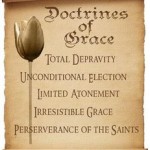 (1) If you are not adverse to extreme satire, you might enjoy this compromised Bible version.
(1) If you are not adverse to extreme satire, you might enjoy this compromised Bible version.
(2) Dan Phillips provides a number of excellent axioms to live by, such as this one:
“If nobody else has ever seen what you’re seeing in the Bible, that’s probably because it isn’t there”.
…and this one:
“Preach like God’s watching, like you’ll never get another chance, and like every second of your hearers’ time is precious.” More here.
(3) Some notable quotes: “I can say from experience that 95% of knowing the will of God consists in being prepared to do it before you know what it is.” – Donald Gray Barnhouse
“Be assiduous in reading the holy Scriptures. This is the fountain whence all knowledge in divinity must be derived. Therefore let not this treasure lie by you neglected. Every man of common understanding who can read, may, if he please, become well acquainted with the Scriptures. And what an excellent attainment would this be!” – Jonathan Edwards
“Thus it comes about that we see men who in [God’s] absence normally remain firm and constant, but who, when he manifests his glory, are so shaken and struck dumb as to be laid low by the dread of death – are in fact overwhelmed by it and almost annihilated. As a consequence, we must infer that man is never sufficiently touched and affected by the awareness of his lowly state until he has compared himself with God’s majesty.” – Calvin, Institutes 1:1:3
“We need to make plain that total depravity is not just badness, but blindness to beauty and deadness to joy; and unconditional election means that the completeness of our joy in Jesus was planned for us before we ever existed; and that limited atonement is the assurance that indestructible joy in God is infallibly secured for us by the blood of the covenant; and irresistible grace is the commitment and power of God’s love to make sure we don’t hold on to suicidal pleasures, and to set us free by the sovereign power of superior delights; and that the perseverance of the saints is the almighty work of God to keep us, through all affliction and suffering, for an inheritance of pleasures at God’s right hand forever.” John Piper, The Legacy of Sovereign Joy: God’s Triumphant Grace in the Lives of Augustine, Luther, and Calvin, p. 73.
(4) I remain very encouraged by the feedback I continue to receive regarding my new book Twelve What Abouts- Answering Common Objections Concerning God’s Sovereignty in Election. If you have no idea what I am talking about, perhaps you would like to click on one of the links on the right hand side of this page for more details. Its available in both eBook and paperback.
(5) Sadly, there’s nothing good in this week’s Friday Ligonier $5 sale. Of course, I’m joking! Check it out here.

 Richard Lucas is a Resident with The NETS Institute for Church Planting and a Ph.D. candidate in New Testament at The Southern Baptist Theological Seminary. He has writen two excellent articles describing the theological map of Reformed thought:
Richard Lucas is a Resident with The NETS Institute for Church Planting and a Ph.D. candidate in New Testament at The Southern Baptist Theological Seminary. He has writen two excellent articles describing the theological map of Reformed thought: